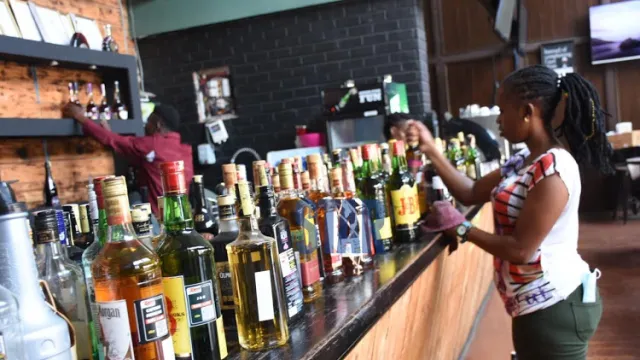Fresh excise tax on hospitality sector will sabotage post-Covid-19 jobs recovery

Fresh excise tax on hospitality sector will sabotage post-Covid-19 jobs recovery
Kenya created a total of 926,100 jobs last year according to Kenya National Bureau of Statistics (KNBS) data, the highest rate in seven years when 929,000 job opportunities were created in 2015.
The new jobs were mainly in the informal space supported by the resumption of economic activity in post-Covi-19 recovery and relaxation of curbs to contain the pandemic.
Lockdown measures and curfew forced restaurants to shut down or operate sub-optimally while shoppers limited expenditure to essentials.
Industries that were constricted such as entertainment and hospitality bounced back fastest as hotels re-opened and hired while driving up sales and demand for goods and services.
Beer and soda companies that were largely hit by the 2020 economic recession got a huge boost from the re-opening of hotels and entertainment outlets.
Genghis Capital research projected that East African Breweries Ltd (EABL) would get a 63 percent uptick in its revenues on senator keg and beer uptake on account of easing coronavirus restrictions.
Manufacturers such as EABL employ thousands of workers directly and have a huge multiplier effect along their value chain, including sorghum farmers, transport and logistics firms, casual laborers, and even workers hired in small bars and restaurants that benefited from this rebound.
The government was also a big beneficiary of this boom, collecting
Kes28.5 billion in excise taxes from beer in 2021 up from Kes19.1 billion in 2020. It is good to note that the tax collected on beer dropped from Kes27.7 billion in 2019.
Read also: Increase in beer tax could bring back Kumi-Kumi
Despite this increase, the State has yet again targeted the industry with a fresh round of tax measures instead of helping the industry recover.
The government is increasingly looking for funding to plug the large budget deficit and one of its soft targets has been alcoholic products.
Falling tax revenues have seen the government slap alcoholic beverages with additional taxes which might dampen the jobs outlook besides negatively impacting the survival of many businesses if sales crash as a result of expensive products.
Excise duties or sin taxes inevitably increase consumer prices of the taxed commodities, thereby lowering consumer demand.
Finance Bill 2022 proposes to increase excise duty on beer by 45 percent and on spirits by 55 percent.
The new money Bill also wants to increase excise on bottles by 25 percent as well as a new 15 percent excise duty on alcohol advertising.
Excise duty Act, through the Finance Bill also empowers the taxman to exclude some products from annual inflation tax adjustment based on the prevailing economic climate, giving the Kenya Revenue Authority power to determine hikes in the sector.
The new taxes are likely to hit the hospitality industry hard the way excise on airtime and data throttled telecoms and eroded tax collected by over Kes7 billion.
Taxes will increase the cost of Kenyan beer multiple times the price of similar products in the East Africa region where Kenya already has the highest charge for a bottle of beer.
Kenya’s fixation with sin taxes on alcohol and cigarettes as the only solution to declining revenues as a percentage of the economy has made the investment in the sector simply unpredictable.
According to the Allianz Risk Barometer, Kenyan businessmen fear legal changes especially on taxation will have an outsized impact on their investments this year, culling growth and cutting back job prospects.
The Allianz Risk survey shows that changes in regulations were the ninth biggest risk in 2021 but have jumped all the way to rank fourth.
An unpredictable legal regime has risen the most among business concerns especially after Kenya promised the International Monetary Fund (IMF) not to relent on taxes committing to follow the programmed fiscal consolidation path.
This has seen State bodies such as KRA prosecute old cases, and even disregard court orders on enforcing a 4.97 percent jump in taxes on beer, bottled water, juices, and cigarettes which had been stopped in December last year.
Bar owners say the KRA systems for filling returns still reflect higher excise duty charges on the commodities, creating confusion among manufacturers on the status of the freeze.
This was an indication that State policy trumps courts and Parliament, a very worrying trend for business given the encouragement from the IMF.
IMF lauded the Treasury for resisting recent Parliamentary pressure to cut fuel taxes and has committed to taking compensatory measures should their appeal to reinstate the corporate minimum tax get rejected.
In Article IV, the multilateral lender bashed the courts stating Judiciary has taken an activist approach striking down attempts to introduce a minimum alternative tax and even the regular inflation adjustment of excise rates.
IMF, however, said with the General Election scheduled for August 2022, tax policy is further complicated by resistance in Parliament to duty increases.
Businesses fear pressure from the multilateral lender will continue affecting state policies impacting business.



